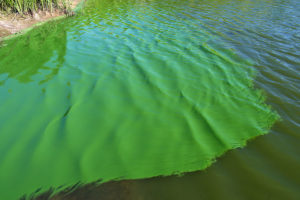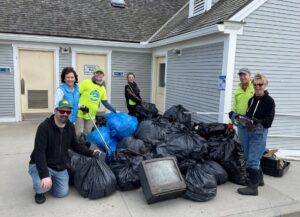
Photo by Christian Fischer
SANDWICH – With more and more algal blooms reported across Cape Cod as the summer heat reaches its peak, Sandwich health officials outlined how they are keeping residents informed and safe.
Cyanobacteria has been reported in multiple bodies of water in several Cape towns, including in Peters Pond in Sandwich.
The algae can be toxic to both humans and pets, and proliferates in warm weather—though blooms have been occurring in higher frequency earlier this year, town officials said.
Dogs are particularly vulnerable, as they may ingest the toxic water while swimming.
“We’re talking about a microorganism that’s very ancient and has been here for millennia. It’s in the environment all the time and in the water all the time, but it’s not a problem until you have a certain amount of density,” said Director of Natural Resources David DeConto.
The algal blooms can also be accelerated by nitrate and phosphate pollution, such as fertilizer or waste from wastewater treatment systems being washed into bodies of water during rain.
Director of Health David Mason said that the Massachusetts Department of Health mandates advisories when the algae is detected in the area.
Director of Reaction Guy Boucher said that they will monitor the ponds as well and ensure that they move activities when blooms are detected, as well have their gate attendants and lifeguards apprise visitors about any current advisories.
“We have several eyes on all the bodies of water,” said Boucher.
“Our lifeguards are there every day. Every morning, it’s part of their job to check the safety of the beach. So that includes the parking lot, the beach itself—making sure there’s no glass or anything like that—but also the water. They’re actually walking the beach, walking the water-line, looking out for any signs of the bacteria, and then reporting that in.”
Boucher said that any report of bacteria will result in the posting of an advisory, if not a closure of the beach for public safety.
Mason said that all municipalities on Cape Cod will abide by state criteria when issuing advisories, which will only affect the specific beach in question, leaving the rest of the body of water open from other points.
“It’s not the entire water body. But at the same time, people around the ponds and other access areas just do need to be aware,” said Mason.
He said that every pond behaves differently ecologically, including winds, creating unique algal situations where some beaches are affected while others at the same body of water are algae-free.
Mason said that other efforts are also underway to eliminate some of the nutrient sources of cyanobacteria blooms, including addressing wastewater infrastructure.























